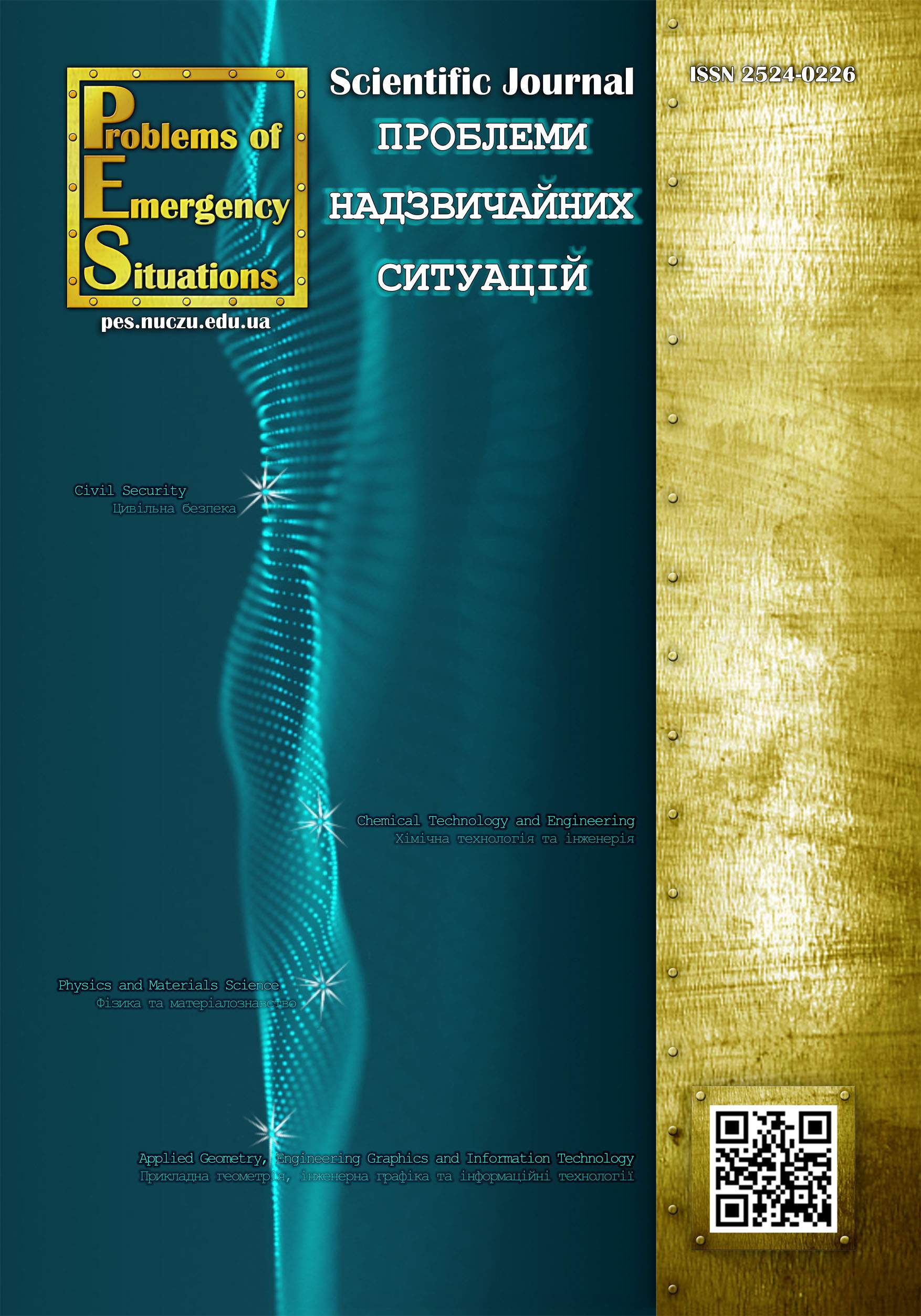Dmytro Beliuchenko
National University of Civil Defence of Ukraine
http://orcid.org/0000-0001-7782-2019
Ihor Hrytsyna
National University of Civil Defence of Ukraine
http://orcid.org/0000-0002-2581-1614
Victor Strelets
National University of Civil Defence of Ukraine
http://orcid.org/0000-0002-9109-8714
DOI: https://doi.org/10.52363/2524-0226-2021-33-9
Keywords: operational calculation of the department, fire and rescue vehicle, fire tanker, operational deployment, operational calculation number, statistical analysis, time distribution
Abstract
A methodology for conducting experimental studies has been developed, which allows one to obtain quantitative estimates of the time of operational deployment from fire tankers, which will simultaneously characterize the class of the fire fighting vehicle, the level of preparedness of personnel and the influence of the number of crews of departments of fire fighting vehicles of different classes by the first operational and rescue unit during liquidation (localization) of technogenic emergencies. Experimental studies, in which subjects from among the cadets of the National University of Civil Protection of Ukraine and fire-fighting operational and rescue units of the Main Directorate of the State Service of Ukraine for Emergency Situations in the Kharkiv region participated, showed that at a significance level of α= 0.05, the results obtained during certain exercises on operational deployment, taking into account the number of the composition of the operational calculation from tank trucks of various classes, in all cases differ significantly. It is shown that at the stage of primary training of rescuers, it is necessary to pay increased atten-tion to training in performing various options for operational deployment from a fire-rescue vehicle in conditions of a decrease in the number of the operational crew of the department, determining the necessary additional operations that must be performed by each rescuer in the absence of the corresponding operational crew number. The strength of the results obtained is the determination of reliable indicators (with a significance level of α= 0.05), which can be the basis for substantiating specific proposals for organizing operational work in conditions of a reduced number of operational calculations for operational and rescue units of the State Emergency Service of Ukraine, fire rescue vehicles of different classes, primarily standards for an objective assessment of the level of preparedness of personnel.
References
- Informacijna – analitychna dovidka pro vynyknennja NS v Ukrai'ni u 2020 ro-ci. Retrieved from https://www.dsns.gov.ua/ua/Dovidka-za-kvartal/119288.html
- World Fire Statistics (2019). N. N. Brushlinsky, M. Ahrens, P. Wagner. № 24. 64. Retrieved from https://www.ctif.org/sites/default/files/2019-04/CTIF_Report24_ERG.pdf
- Review of Emergency Responder Standard Operating Procedures. Retrieved from https://www.nfpa.org//-/media/Files/News-and-Research/Fire-statistics-and-reports/Emergency-responders/RFReviewOfEmergencyResponderSOPSOGs.pdf
- Fire and Emergency Service Personnel Knowledge and Skills Proficiency. Re-trieved from https://www.nfpa.org//-/media/Files/News-and-Research/Fire-statistics-and-reports/Emergency-responders/RFFEMSProficiency.pdf
- Evaluation of Fire Service Training Fires. Retrieved from: https://www.nfpa.org/-/media/Files/News-and-Research/Fire-statistics-and-reports/Emergency-responders/RFEvaluationofFireServiceTraining.ashx
- Training for failure in the united states fire service. Retrieved from https://calhoun.nps.edu/bitstream/handle/10945/64038/19Dec_O%27Neal_David.pdf?sequence=1&isAllowed=y
- Framework for the competence of rescue and fire fighting service (RFFS) personnel. Retrieved from https://publicapps.caa.co.uk/docs/33/CAP699E3Jan2017(BM).pdf
- NFPA 1001, Standard for Fire Fighter Professional Qualifications. Retrieved from https://sa5e44a321405f035.jimcontent.com/download/version/1268192963/module/3735826357/name/61ns.pdf
- NFPA 1710 Standard for the Organization and Deployment of Fire Sup-pression Operations, Emergency Medical Operations, and Special Operations to the Public by Career Fire Departments. Retrieved from https://www.como.gov/CMS/granicus/downloadfile.php?id=11785&type=attachment
- NFPA 1720. Standard for the Organization and Deployment of Fire Suppres Operations, Emergency Medical Operations, and Special Operations to the Public by Volunteer Fire Departments. Retrieved from http://www.niordc.ir/uploads/nfpa_1720_-.pdf
- Alternative deployment models for the fire service. Retrieved from https://www.firerescue1.com/fire-chief/articles/alternative-deployment-models-for-the-fire-service-34lJK0Q3UF5ZjRiB
- Fire and emergency service personnel knowledge and skills proficiency. Re-trieved from https://www.nfpa.org//-/media/Files/News-and-Research/Fire-statistics-and-reports/Emergency-responders/RFFEMSProficiency.pdf
- Training Related Risk Factors of Firefighters. Retrieved from https://www.researchgate.net/publication/320545566_Training_Related_Risk_Factors_of_Firefighters
- Training Related Risk Factors of Firefighters. Retrieved from https://www.researchgate.net/publication/320545566_Training_Related_Risk_Factors_of_Firefighters
- NFPA'"RESEARCH" US Fire Department Profile 2018. Retrieved from https://www.nfpa.org/-/media/Files/News-and-Research/Fire-statistics-and-reports/Emergency-responders/osfdprofile.pdf
- Fire Protection Handbook. Retrieved from https://tocanthike.files.wordpress.com/2015/10/nfpa-fire-protection-handbook-20th-edition.pdf
- Principal Emergency Response and Preparedness. Requirements and Guid-ance. Retrieved from https://www.osha.gov/sites/default/files/publications/osha3122.pdf.
- NFPA 1410 Standard on Training for Initial Emergency Scene Operations. Retrieved from http://www.niordc.ir/uploads/nfpa_1410_-_2005.pdf
- Features of the organization fighting fires at low temperatures. Retrieved from https://narfu.ru/upload/iblock/8ca/mbwsrrzqgqfprsjtwbrrcq%20likziilcgmqtlrziqkglez%20uoirueszlbewgn%20cpnzkadzskkmjj%20ip%20enzzakluhqvhqpxh.pdf
- Fire and emergency service personnel knowledge and skills proficiency. Re-trieved from https://www.nfpa.org//-/media/Files/News-and-Research/Fire-statistics-and-reports/Emergency-responders/RFFEMSProficiency.pdf
- Beljuchenko, D. Ju., Strilec', V. M. (2020). Bagatofaktorna ocinka efektyvnosti operatyvnogo rozgortannja pozhezhnyh avtomobiliv v umovah vynyknennja nadzvychajnyh sytuacij tehnogennogo harakteru // Komunal'ne gospodarstvo mist. Harkiv. 156. 204-211. doi: 10.33042/2522-1809-2020-3-156-204-211
- Illowsky, B., Dean, S. (2014). Introductory Statistics. OpenStax CNX, 67–74. Retrieved from https://openstax.org/details/introductory-statistics
- Denworth, L. (2019). A Significant Problem: Standard scientific methods are under fire. Journal of Scientific American, 321(4), 62–67. Retrieved from https://uk.wikipedia.org/wiki/Scientific_American














